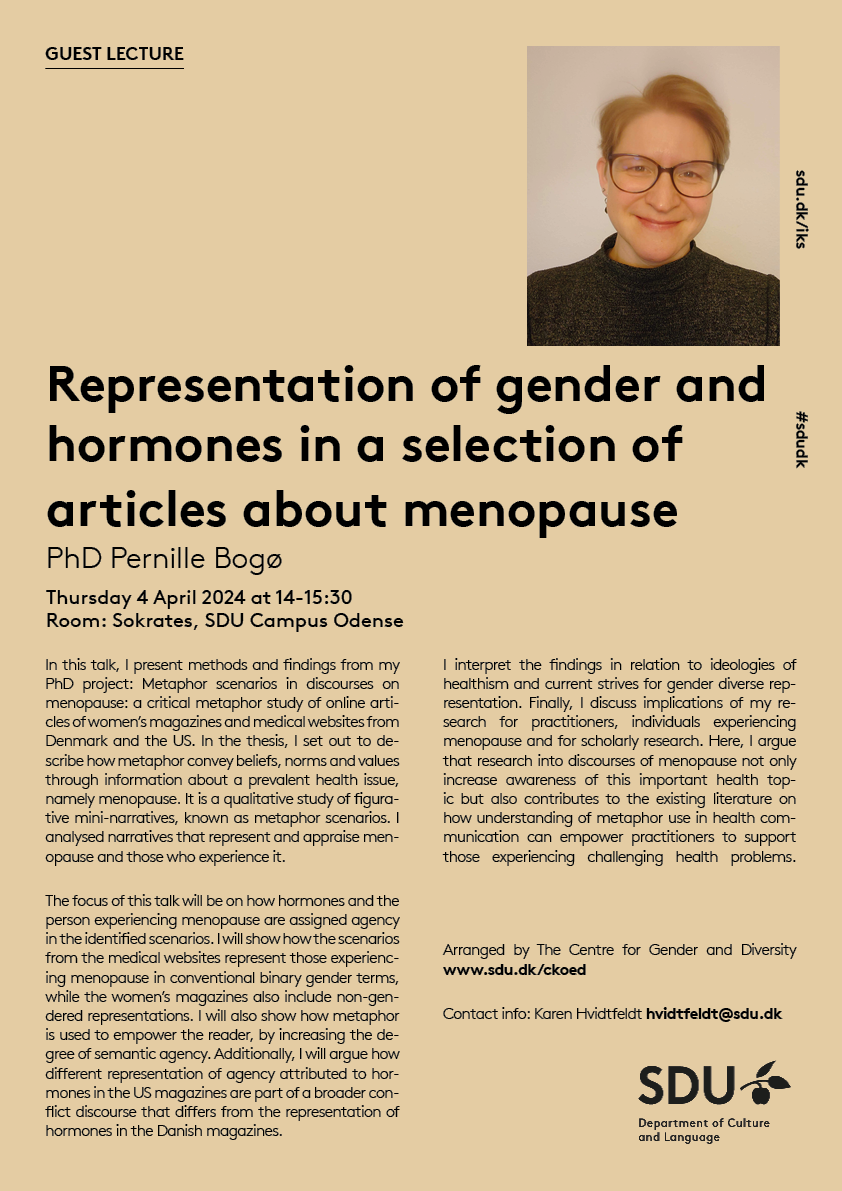
Representation of gender and hormones in a selection of articles about menopause - Thursday 4 April
In this talk, I present methods and findings from my PhD project: Metaphor scenarios in discourses on menopause: a critical metaphor study of online articles of women’s magazines and medical websites from Denmark and the US.
Guest Lecture: PhD Pernille Bogø
Representation of gender and hormones in a selection of articles about menopause
In this talk, I present methods and findings from my PhD project: Metaphor scenarios in discourses on menopause: a critical metaphor study of online articles of women’s magazines and medical websites from Denmark and the US. In the thesis, I set out to describe how metaphor convey beliefs, norms and values through information about a prevalent health issue, namely menopause. It is a qualitative study of figurative mini-narratives, known as metaphor scenarios. I analysed narratives that represent and appraise menopause and those who experience it.
The focus of this talk will be on how hormones and the person experiencing menopause are assigned agency in the identified scenarios. I will show how the scenarios from the medical websites represent those experiencing menopause in conventional binary gender terms, while the women’s magazines also include non-gendered representations. I will also show how metaphor is used to empower the reader, by increasing the degree of semantic agency. Additionally, I will argue how different representation of agency attributed to hormones in the US magazines are part of a broader conflict discourse that differs from the representation of hormones in the Danish magazines.
I interpret the findings in relation to ideologies of healthism and current strives for gender diverse representation. Finally, I discuss implications of my research for practitioners, individuals experiencing menopause and for scholarly research. Here, I argue that research into discourses of menopause not only increase awareness of this important health topic but also contributes to the existing literature on how understanding of metaphor use in health communication can empower practitioners to support those experiencing challenging health problems.
References:
Bogø-Jørgensen, P. (2023) Metaphor scenarios in discourses on menopause: a critical metaphor study of online articles of women’s magazines and medical websites from Denmark and the US. Lancaster University, Lancaster, UK.
Darics E and Koller V (2019) Social Actors ‘to go’: An analytical toolkit to explore agency in business communication. Business and Professional Communication Quarterly 82(2): 214–238.
Demjén Z and Semino E (2017) Using metaphor in healthcare: physical health. In: The Routledge Handbook of Metaphor and Language. Routledge Handbooks in Linguistics. Routledge, pp. 385–399.
Koller, V. (2014). “Cognitive linguistics and ideology” In J. Littlemore & J. R. Taylor (eds), The Bloomsbury companion to cognitive linguistics. London, England: Bloomsbury, pp. 234-252
Musolff A (2006) Metaphor scenarios in public discourse. Metaphor and Symbol 21(1): 23–38.
